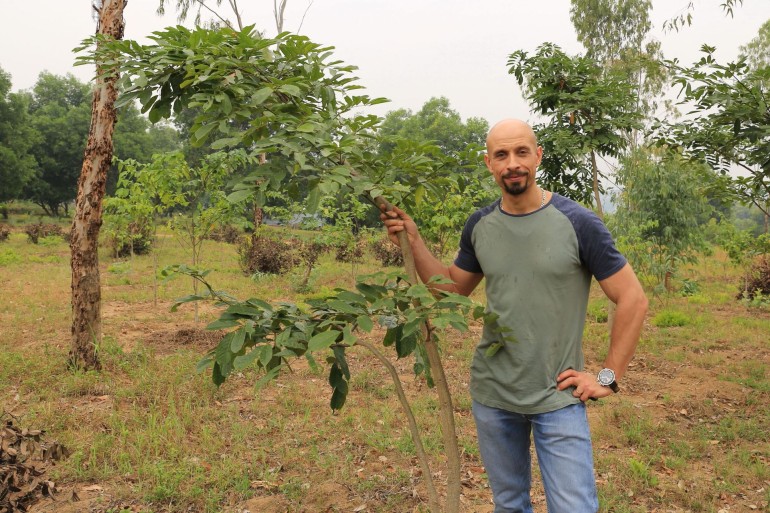Link(s) :


10.11.2023
Jean-Louis Doucet, researcher and teacher at Gembloux AgroBio-Tech, talks about his work and tropical forest ecosystems in a film about his students' field trip, as well as in a documentary on forest biodiversity.

Professor of tropical forestry at Gembloux Agro-Bio Tech, Jean-Louis Doucet confesses that he never misses an opportunity to leave the dreariness of Belgium for the warmth of the forests of Central and West Africa, and is involved in a wide range of projects in the world's second largest continuous forest, after Amazonia. we are studying different methods of supporting the regeneration of tropical species," explains the researcher, "as well as the way in which wildlife, such as elephants or big cats, influence forest regeneration. "
Jean-Louis Doucet is also involved in agroforestry projects, such as sustainable cocoa cultivation, and the production of popular science books on tropical wood. species recognition is a knowledge that is being lost," he laments, "and we try to safeguard it as much as possible. I'm also working on books describing the use of wood, recording its uses and properties. "
Exploiting forests ... to protect them
Promoting the use of tropical wood to combat deforestation: a seemingly contradictory idea, which seems to run counter to current efforts to safeguard the world's forests. nobody disputes the need to preserve them, through networks of protected areas," says Jean-Louis Doucet. But it's also essential that part of them be exploited to produce timber. Otherwise, these forests will no longer have any value for the countries of the South, which will prefer to raze them and convert them to farmland. Exploiting the forest means helping to protect all the species that live there.
And contrary to what you might think, this has nothing to do with deforestation. tropical forests are extremely diverse, and not all species can be exploited to produce timber," explains the researcher. In Central Africa, only one tree is harvested per hectare, every 20 to 25 years. That's about one tree per soccer pitch!
What's more, using this wood helps combat global warming. " By avoiding land conversion, forestry helps maintain significant carbon stocks. What's more, the carbon dioxide captured by the forest is fixed in the wood for as long as it is used," points out Jean-Louis Doucet. And tropical wood has many interesting properties, both in terms of aesthetics and durability, especially for outdoor use... However, by dint of presenting the exploitation of tropical forests as a source of deforestation, European consumers are turning away from them in favor of other materials such as PVC or aluminum, which are major sources of greenhouse gas emissions! "
All together
The researcher is therefore campaigning for greater collaboration with the countries responsible for these forests. And here again, far from the clichés about Africa, many of them are working hard. several Central African countries are making considerable efforts to promote a policy of sustainable forest management, with the introduction of appropriate legislation," he maintains. And others, like Gabon, are going even further, by requiring all forest operators to move towards sustainable management certification, via the FSC or PEFC labels. Before long, almost all of Gabon's forests will be certified sustainable, while the rest will be under protected status.
For his part, Jean-Louis Doucet tries as far as possible to put his expertise at the service of the community. He is a director of ATIBT, the Association Technique Internationale du Bois Tropical, which seeks to unite all players in the tropical forestry sector around sustainable management. This includes not only operators, but also traders, engineering firms and others The aim is to raise awareness of best practices across the entire forestry chain ", says the researcher.
He is also active in Nature+, an association he helped to set up, which also promotes sustainable management in tropical natural environments, thanks to a collaboration with the University of Liège. "This makes it possible to combine the fundamental research carried out by the faculty with the implementation of results obtained directly in the field, involving local populations and private operators ", he explains.
Opening up to the world
Among all the players in this chain of exploitation, the University undoubtedly occupies a special place for the professor, who teaches part of his courses directly on site, in the middle of the rainforest. itake my students for three weeks to the heart of a logging concession, to familiarize them with every stage of the process, from logging techniques to wildlife management and the participation of local populations," he explains. In my opinion, this kind of openness is essential to instill in them a certain critical outlook.
It's an outlook that Jean-Louis Doucet would like to see more widely disseminated among the European population, to encourage them to remain open to the world. there's a current tendency towards protectionism and inward-looking attitudes, and I insist that my students go out and meet others," he stresses.For me, that'sthe best way to get the next generation to do better than in the past.
Jean-Louis Doucet also talks about tropical forests in a documentary entitled "From oak to okoumé: biodiversity takes root".
Link(s) :